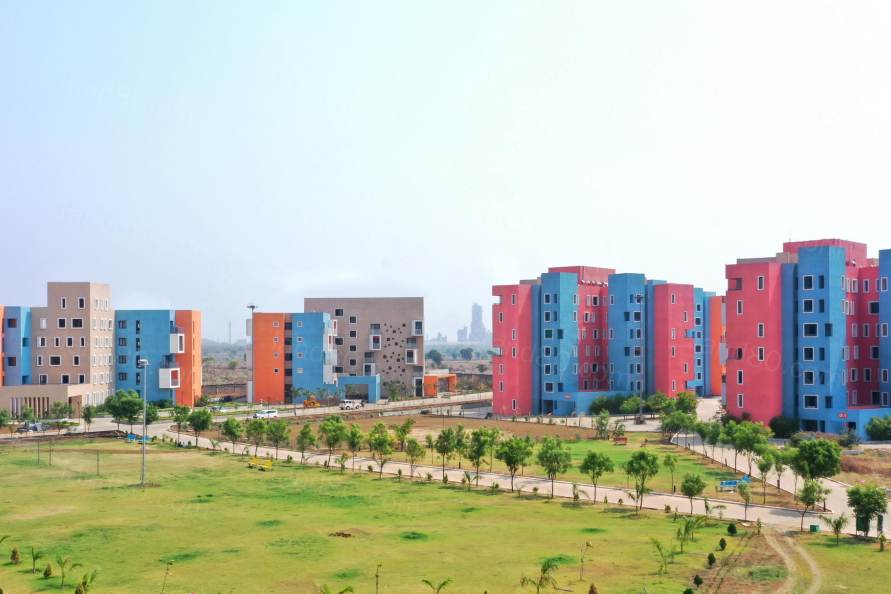项目从印度旧城和村庄住房中的自然布局中汲取灵感,不拘泥于常规布局。
Taking cues from the organic housing
layouts of old Indian cities & villages, this housing project has an
informal layout.




该住宅是为水泥厂人员而开发、面积36英亩的自用住房项目总体规划的一部分,距离最近的小城市约3公里,周围并无其他开发项目,环绕着一片开阔的土地。
Part of a masterplan of a 36-acre,
self-sufficient housing project being developed for the personnel of a cement
plant, this project is located 3 km from the closest small city amidst open
land all around, with no other development in the vicinity.

项目整体为一个大型的开放式园景公园,中间穿插着小型和大型公寓、一所学校以及场地周边的俱乐部。
A large, open landscaped park punctuates
the overall masterplan with studio apartments, smaller & larger apartments,
a school, and a club along the perimeter of the site.


在6英亩(24281平方米)的场地中,一座包含72个单间公寓、48个2卧公寓和48个3卧公寓的中层建筑被规划成自然布局。 每栋建筑都设有带遮荫的开放庭院、带有自然通风的流通空间、以及建筑相邻之间的花园空间。
Within an area of 6 acres (24281sq.m.), a
mid-rise building housing 72 studio apartments, 48 nos. of 2-bedroom
apartments, and 48 nos. of 3 bedroom apartments are planned in an organic
layout. Each building is designed with sheltered open courtyards,
naturally ventilated circulation spaces, and garden spaces between them.


▽室内空间


每栋公寓都设有嵌入式窗户和遮阳阳台,提供交叉通风为建筑降温,以应对当地每年8个月保持在35℃以上的炎热气候。
All of the apartments are designed with
recessed windows, sheltered balconies, and cross ventilation to mitigate heat
gain in response to the hot climate of the location, where temperatures remain
in excess of 35°C for 8 months annually.


色彩在项目中起着重要作用,使用不同的色彩组合来区分房屋内的不同建筑类型。鲜艳的色彩是印度传统节日、服装、装饰品、住宅和食物中不可或缺的一部分。
Color plays an important role in the
project, with different color combinations used to identify the different
building typologies within the housing. Vibrant colors are an integral part of
traditional festivals, clothing, ornaments, housing, and food in India.



项目整体布局规划为36000平方米。花园与公寓楼的设计旨在创造其间私密的庇护空间。这些空间布局各异,由各栋建筑的自然形态而定,从而创造了多个不同形态和围墙的空间。项目内的所有水都通过污水处理厂回收和再利用。广泛的雨水收集与规划相结合。设计还确保并促进了自然采光和室内空间的通风。
Since the overall layout is planned with a
large 36,000 sq.m. garden, the apartment buildings are designed to create
intimate sheltered spaces between them. These spaces are varied in each part of
the layout by the organic nature of the building placement, creating multiple
spaces with varying degrees of enclosure and shape. All of the water within the
project is recycled and reused through its own sewage treatment plant.
Extensive rain water harvesting is integrated with the planning. The design
also ensures and facilitates natural light and ventilation to all the spaces
within.
▽室内空间具有良好的自然采光和通风


Shree Town是与周围环境紧密相连的住宅项目,采用可持续地设计以响应气候,并吸收传统文化和当地规划原则。
Shree Town is a contextual housing project
that is sustainably designed to respond to the climate, imbibing traditional
planning principles, and cultural responses.
▽平面图

▽剖面图

Technical sheet
Project Type: Residential
No. of Floors: G+4 & S+6
Location: Raipur, Chhattisgarh
Commencement Date: December 2016
Completion Date: April 2020
Client Name: Shree Cement Ltd.
Construction Company: Shree Cement
Ltd.
Size of the Project: 3,15,000 sq.ft.
(29,264 sq.m.)
Cost of the Project: 81,81,818
USD
Design Company: Sanjay Puri Architects
Lead Architects: Mr. Sanjay Puri
Design Team – Ruchika Gupta, Kaushik Sheth,
Manveer Chopra, Rohan Shiktode, Karun Chughasrani, Keval Shah, Ronak
Kothari
Consultants:
Interior design Consultant – Baheti &
Associates
Structural Consultant – Dr. Kelkar Design
Pvt. Ltd.
MEP Consultant – Epsilon Design Consultancy
Pvt. Ltd.
Photo credits: Mr. Dinesh Mehta
|